新概念第二册Lesson21 Mad or not讲义
文档属性
| 名称 | 新概念第二册Lesson21 Mad or not讲义 | 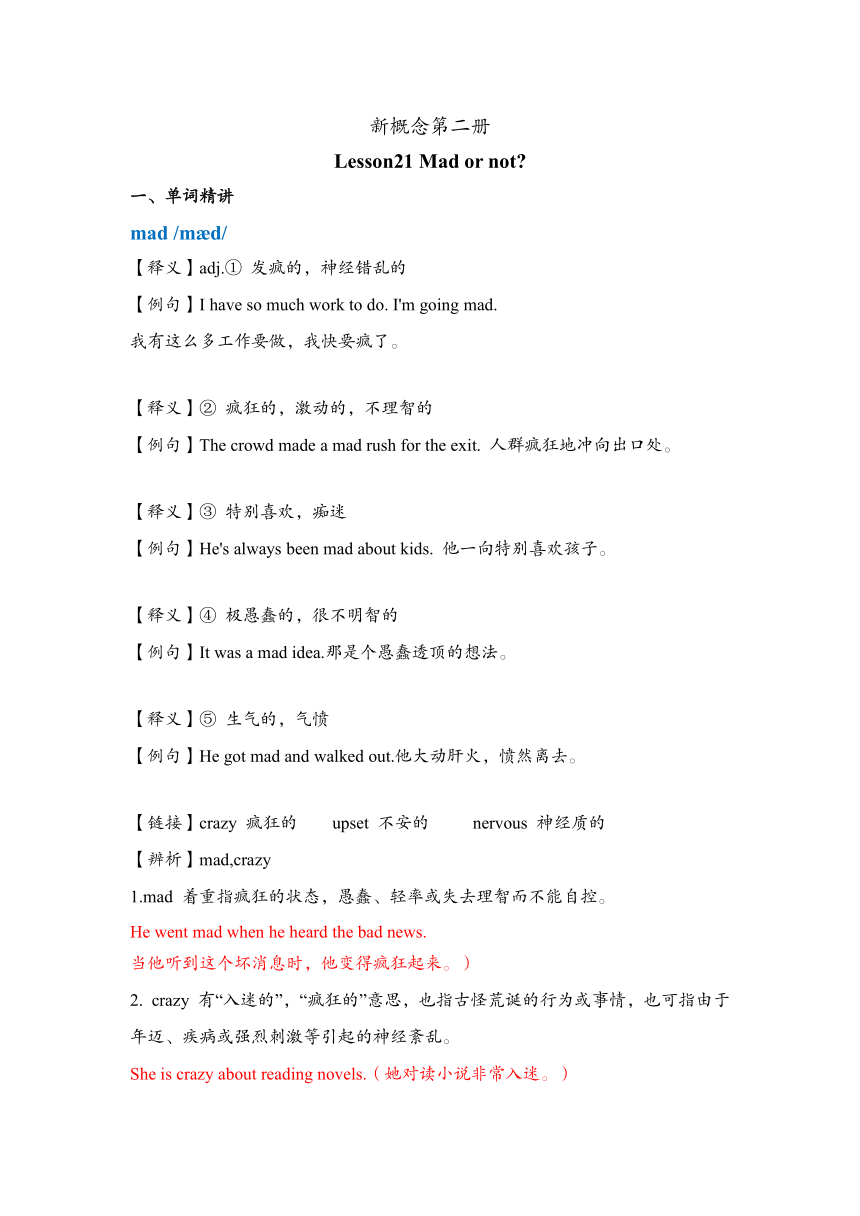 | |
| 格式 | docx | ||
| 文件大小 | 177.7KB | ||
| 资源类型 | 教案 | ||
| 版本资源 | 新概念英语 | ||
| 科目 | 英语 | ||
| 更新时间 | 2024-11-21 08:23:53 | ||
图片预览

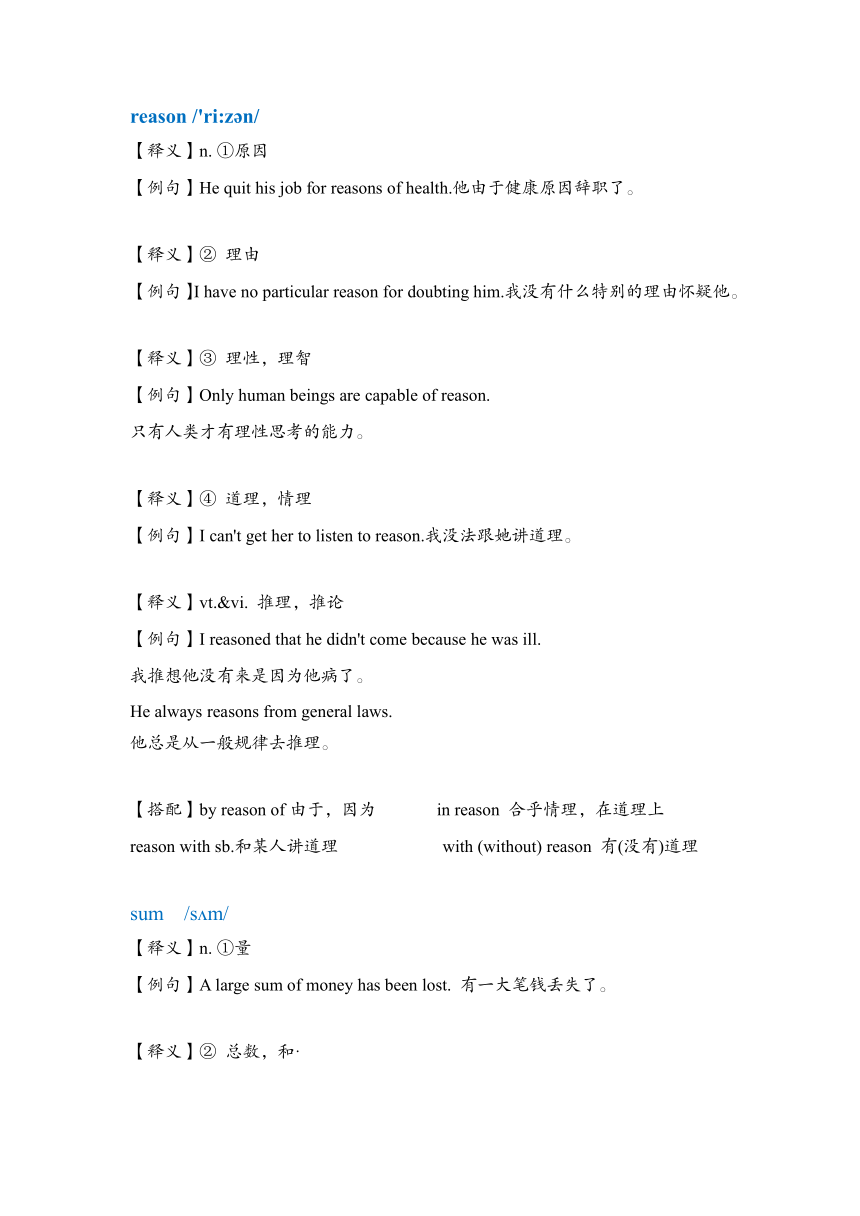
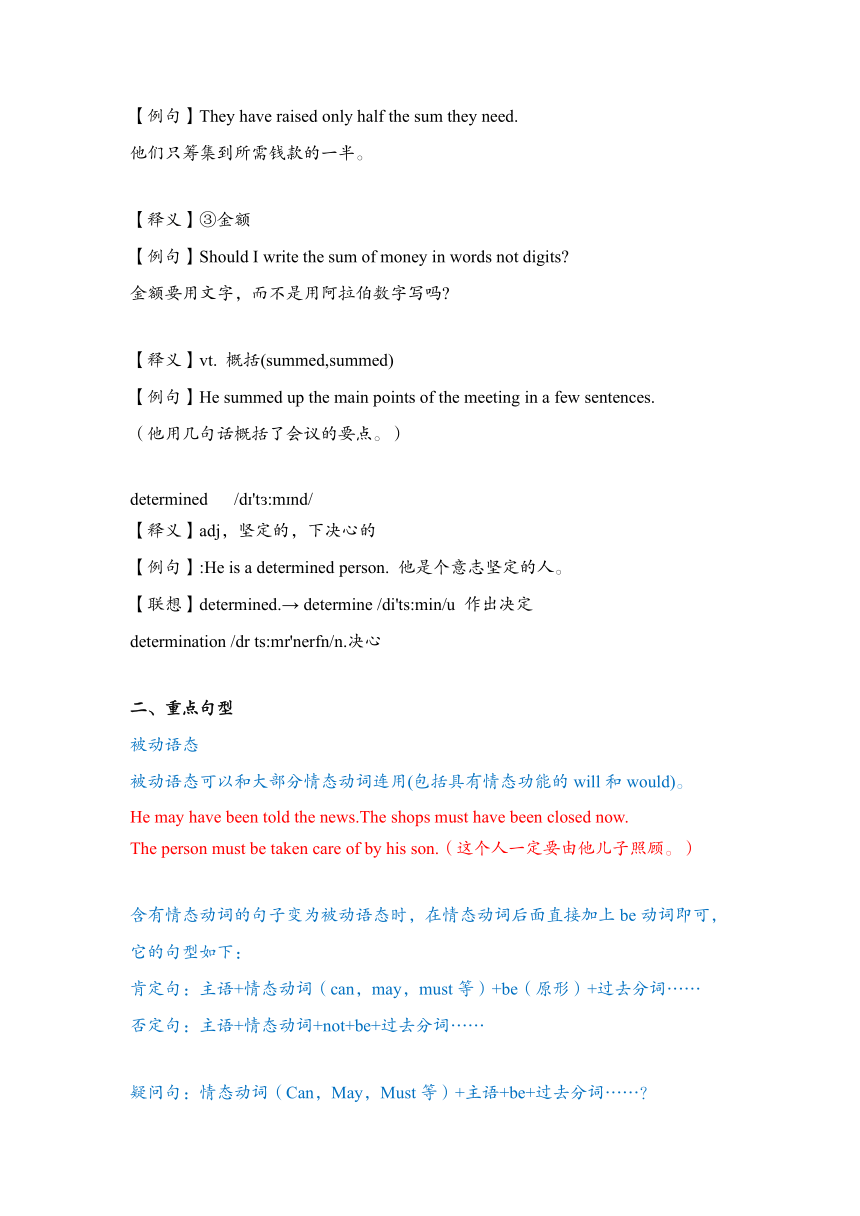
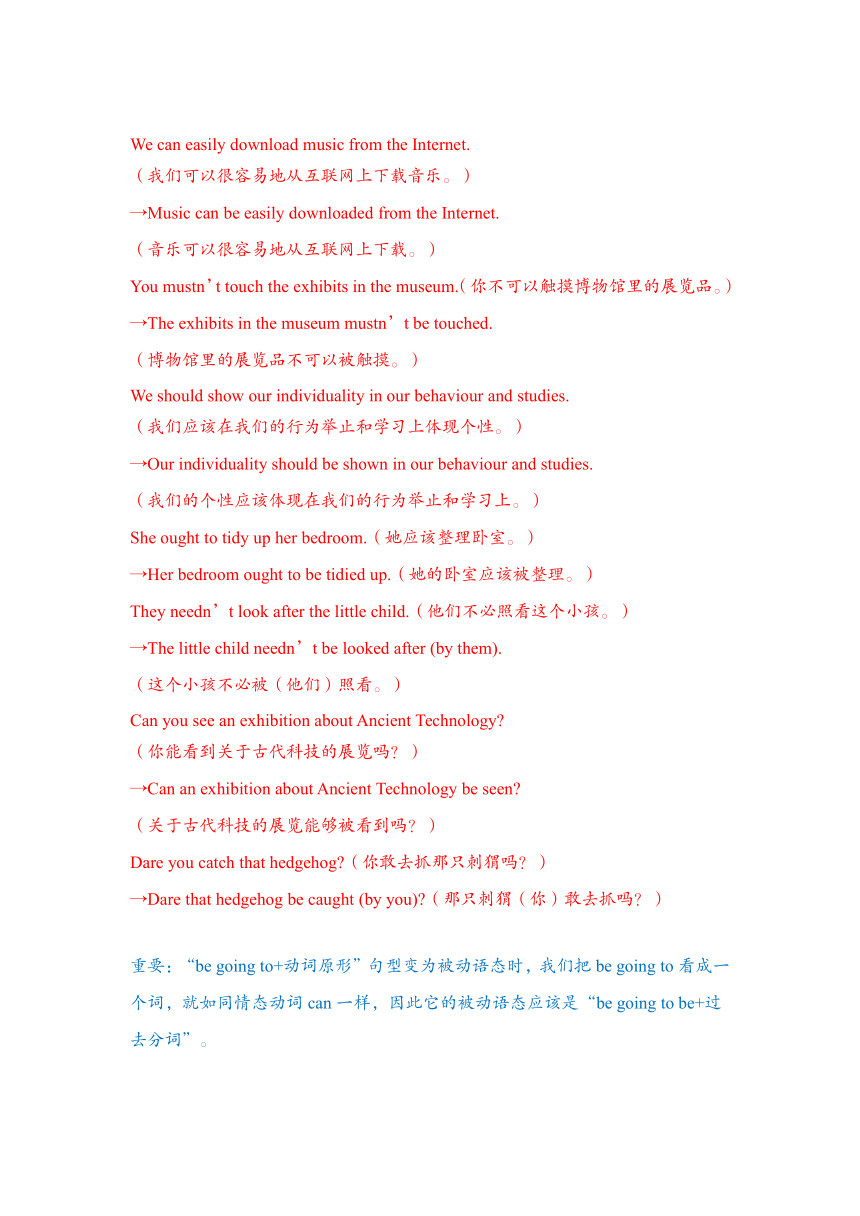
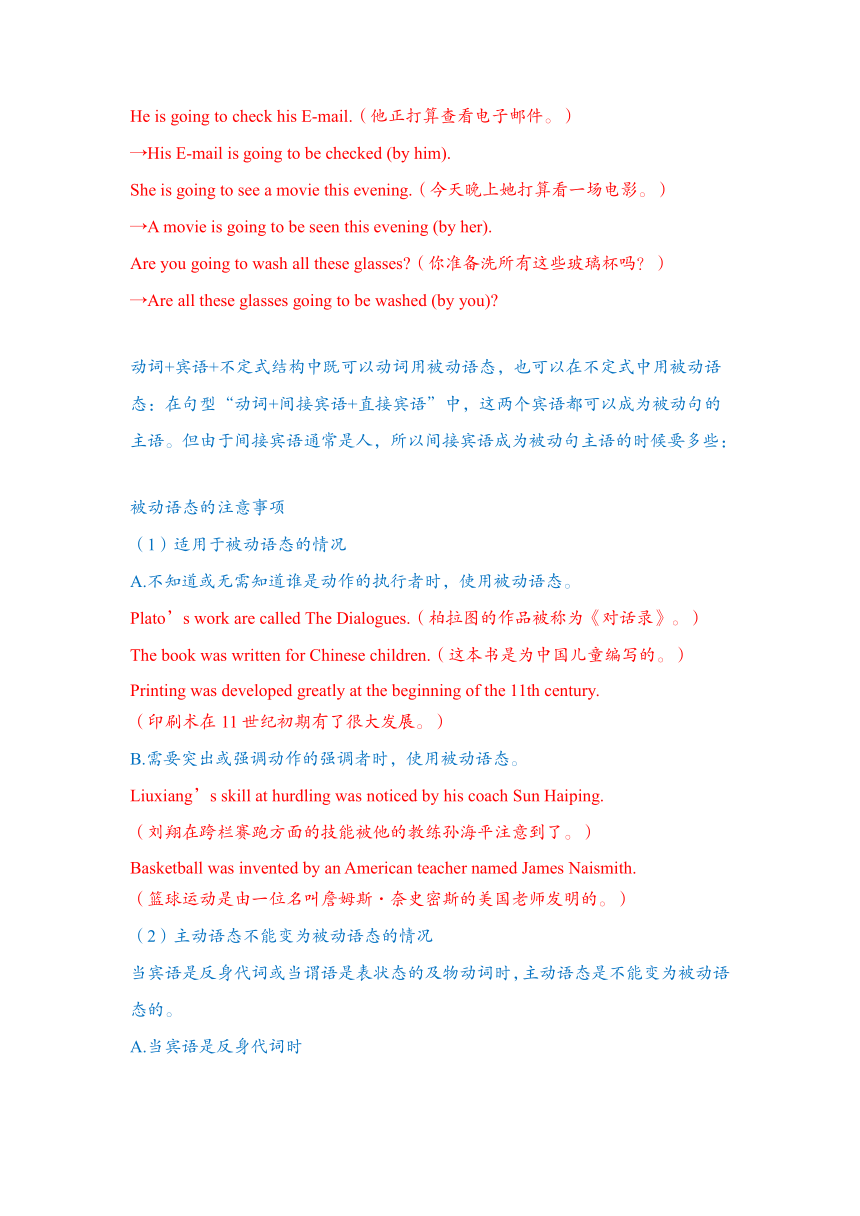
文档简介
新概念第二册
Lesson21 Mad or not
单词精讲
mad /m d/
【释义】adj.① 发疯的,神经错乱的
【例句】I have so much work to do. I'm going mad.
我有这么多工作要做,我快要疯了。
【释义】② 疯狂的,激动的,不理智的
【例句】The crowd made a mad rush for the exit. 人群疯狂地冲向出口处。
【释义】③ 特别喜欢,痴迷
【例句】He's always been mad about kids. 他一向特别喜欢孩子。
【释义】④ 极愚蠢的,很不明智的
【例句】It was a mad idea.那是个愚蠢透顶的想法。
【释义】⑤ 生气的,气愤
【例句】He got mad and walked out.他大动肝火,愤然离去。
【链接】crazy 疯狂的 upset 不安的 nervous 神经质的
【辨析】mad,crazy
1.mad 着重指疯狂的状态,愚蠢、轻率或失去理智而不能自控。
He went mad when he heard the bad news.
当他听到这个坏消息时,他变得疯狂起来。)
crazy 有“入迷的”,“疯狂的”意思,也指古怪荒诞的行为或事情,也可指由于年迈、疾病或强烈刺激等引起的神经紊乱。
She is crazy about reading novels.(她对读小说非常入迷。)
reason /'ri:z n/
【释义】n. ①原因
【例句】He quit his job for reasons of health.他由于健康原因辞职了。
【释义】② 理由
【例句】I have no particular reason for doubting him.我没有什么特别的理由怀疑他。
【释义】③ 理性,理智
【例句】Only human beings are capable of reason.
只有人类才有理性思考的能力。
【释义】④ 道理,情理
【例句】I can't get her to listen to reason.我没法跟她讲道理。
【释义】vt.&vi. 推理,推论
【例句】I reasoned that he didn't come because he was ill.
我推想他没有来是因为他病了。
He always reasons from general laws.
他总是从一般规律去推理。
【搭配】by reason of由于,因为 in reason 合乎情理,在道理上
reason with sb.和某人讲道理 with (without) reason 有(没有)道理
sum /s m/
【释义】n. ①量
【例句】A large sum of money has been lost. 有一大笔钱丢失了。
【释义】② 总数,和·
【例句】They have raised only half the sum they need.
他们只筹集到所需钱款的一半。
【释义】③金额
【例句】Should I write the sum of money in words not digits
金额要用文字,而不是用阿拉伯数字写吗
【释义】vt. 概括(summed,summed)
【例句】He summed up the main points of the meeting in a few sentences.
(他用几句话概括了会议的要点。)
determined /d 't :m nd/
【释义】adj,坚定的,下决心的
【例句】:He is a determined person. 他是个意志坚定的人。
【联想】determined.→ determine /di'ts:min/u 作出决定
determination /dr ts:mr'nerfn/n.决心
重点句型
被动语态
被动语态可以和大部分情态动词连用(包括具有情态功能的will和would)。
He may have been told the news.The shops must have been closed now.
The person must be taken care of by his son.(这个人一定要由他儿子照顾。)
含有情态动词的句子变为被动语态时,在情态动词后面直接加上be动词即可,它的句型如下:
肯定句:主语+情态动词(can,may,must等)+be(原形)+过去分词……
否定句:主语+情态动词+not+be+过去分词……
疑问句:情态动词(Can,May,Must等)+主语+be+过去分词……?
We can easily download music from the Internet.
(我们可以很容易地从互联网上下载音乐。)
→Music can be easily downloaded from the Internet.
(音乐可以很容易地从互联网上下载。)
You mustn’t touch the exhibits in the museum.(你不可以触摸博物馆里的展览品。)
→The exhibits in the museum mustn’t be touched.
(博物馆里的展览品不可以被触摸。)
We should show our individuality in our behaviour and studies.
(我们应该在我们的行为举止和学习上体现个性。)
→Our individuality should be shown in our behaviour and studies.
(我们的个性应该体现在我们的行为举止和学习上。)
She ought to tidy up her bedroom.(她应该整理卧室。)
→Her bedroom ought to be tidied up.(她的卧室应该被整理。)
They needn’t look after the little child.(他们不必照看这个小孩。)
→The little child needn’t be looked after (by them).
(这个小孩不必被(他们)照看。)
Can you see an exhibition about Ancient Technology
(你能看到关于古代科技的展览吗?)
→Can an exhibition about Ancient Technology be seen
(关于古代科技的展览能够被看到吗?)
Dare you catch that hedgehog (你敢去抓那只刺猬吗?)
→Dare that hedgehog be caught (by you) (那只刺猬(你)敢去抓吗?)
重要:“be going to+动词原形”句型变为被动语态时,我们把be going to看成一个词,就如同情态动词can一样,因此它的被动语态应该是“be going to be+过去分词”。
He is going to check his E-mail.(他正打算查看电子邮件。)
→His E-mail is going to be checked (by him).
She is going to see a movie this evening.(今天晚上她打算看一场电影。)
→A movie is going to be seen this evening (by her).
Are you going to wash all these glasses (你准备洗所有这些玻璃杯吗?)
→Are all these glasses going to be washed (by you)
动词+宾语+不定式结构中既可以动词用被动语态,也可以在不定式中用被动语态:在句型“动词+间接宾语+直接宾语”中,这两个宾语都可以成为被动句的主语。但由于间接宾语通常是人,所以间接宾语成为被动句主语的时候要多些:
被动语态的注意事项
(1)适用于被动语态的情况
A.不知道或无需知道谁是动作的执行者时,使用被动语态。
Plato’s work are called The Dialogues.(柏拉图的作品被称为《对话录》。)
The book was written for Chinese children.(这本书是为中国儿童编写的。)
Printing was developed greatly at the beginning of the 11th century.
(印刷术在11世纪初期有了很大发展。)
B.需要突出或强调动作的强调者时,使用被动语态。
Liuxiang’s skill at hurdling was noticed by his coach Sun Haiping.
(刘翔在跨栏赛跑方面的技能被他的教练孙海平注意到了。)
Basketball was invented by an American teacher named James Naismith.
(篮球运动是由一位名叫詹姆斯·奈史密斯的美国老师发明的。)
(2)主动语态不能变为被动语态的情况
当宾语是反身代词或当谓语是表状态的及物动词时,主动语态是不能变为被动语态的。
A.当宾语是反身代词时
The man introduced himself as Mr.Parker.(那个人自我介绍说他是帕克先生。)
I found myself in the park.(我不知不觉来到公园里。)
B.当谓语是表状态的及物动词时
Does the pair of new shoes suit you (那双新鞋你穿着合适吗?)
We will have a meeting.(我们将开个会。)
说明:have是表状态的及物动词,不能变为被动语态,而如果该句用了hold则可变为被动语态,见下例:( )A meeting will be held.(×)A meeting will be had.
(3)被动语态与系表结构的区别
“be+过去分词”可能是被动语态,也可能是系表结构,其主要区别是:被动语态表示以主语为承受者的动作,而系表结构则表示主语的特点或所处的状态。
The letter was written yesterday.(信是昨天写的。)(动作)
The letter is written in English.(这封信是用英文写的。)(特点)
The store was closed at five.(这个商店5点钟关门。)(动作)
The store is close today.(这个商店今天不开门。)(状态)
补充:为了明确说明该被动语态是表示动作的,可用get来代替be动词。
My bike got stolen.(我的自行车被偷了。)(got代替was)
陷阱例题①
A:Mom,can I go out to play basketball
B:Sure.But your homework __________ first.
A.must be finished
B.must finish
C.will finish
D.finish
句意提示:A:妈妈,我能出去打篮球吗?
B:当然可以。但是你必须先完成家庭作业。
陷阱追击:如分辨不清句中主语和谓语动词的关系,则容易误选。
正确解析:主语your homework是谓语动词finish的承受者,所以用含有情态动词的被动语态结构“情态动词+be+过去分词”。正确答案为A。
陷阱例题②
A:Would you like to go to the movie with me
B:Sorry,I __________ to go out tonight.
A.won’t be allowed
B.am allowed
C.don’t allow
D.will allow
句意提示:A:你愿意和我一起去看电影吗?B:对不起,今晚我不被允许外出。
陷阱追击:如忽视了答语中表示将来的时间状语tonight和表示否定的信息提示词sorry,则容易误选。
正确解析:be allowed to do sth.意为“被允许做某事”。一般将来时被动语态的否定结构是“will not be+过去分词”。正确答案为A。
陷阱例题③
Mike,you __________ on the phone.
A.is wanted
B.want
C.are wanting
D.are wanted
句意提示:迈克,有电话找你。
陷阱追击:如分辨不清主语是动作的执行者还是承受者,则容易误选。
正确解析:主语you是谓语动词want的承受者,所以用被动语态。正确答案为D。
三、课文精讲
Aeroplanes are slowly driving me mad.飞机正在逐渐把我逼疯。
aeroplane n. 飞机 = aircraft, plane;
slowly adv. 慢慢地
slow adj. slowness n.;
drive-drove-driven v. 迫使 逼得 开车 ; drive sb. mad 把某人逼疯 ;
mad adj. 疯的
be mad at 对 ... 生气 恼火 ;
drive sb. mad 逼某人发疯
I live near an airport and passing planes can be heard night and day.
我住在一个机场附近,过往飞机日夜不绝于耳。
★ can be heard 被
动语态 , 情态动词的被动语态结构为 : 情态动词 + be + 过去分词 ;
night and day 日日夜夜,夜以继日 (注意连读)
passing planes 过往飞机 (passing是现在分词,作定语,起形容词作用,修饰planes,“经过的(路过),过往的”) He forgot the man with passing time. 随着时间的消逝,他忘掉了那个人。
The airport was built years ago, but for some reason it could not be used then.
机场是许多年前建的,但由于某种原因当时未能启用。
for some reason 由于某种原因 ;
some 表示某一个 ;
reason n. 原因 ;
for this reason 由于这个理由 原因 ;
use v. 使用 usage n. 使用 利用 ;
years前不加确定的数词时,一般表示“许多年”years ago = many years ago,weeks等的用法与它相似
some+不可数名词/可数名词复数 一些……
some+可数名词单数 某一…
for some reason 由于某个理由
We’ll talk about it some other time. 我们改日再谈论。
Last year, however, it came into use.然而去年机场开始使用了。
however adv. 然而 但是 , 作副词时 , 多放在句子中间 , 有时亦可置于句首或句末 ; come into use 启用 = It was put into use.; come into 只有主动语态 ;
come-came-come;
come into being 形成 产生 开始存在 ;
last year 上一年 [ 过去时 ]
next year 下一年 [ 将来时 ];
Over a hundred people must have been driven away from their homes by the noise.有 100 多人肯定是被噪音逼得已经弃家远去
must have been done 过去发生, 表示推测,被动
away from 从某地离开(away 离开某地)
out of somewhere 从某地出来
I am one of the few people left.我是少数留下来的人中的一个。
one of… ……之一(表示特指的一群人/一些东西中的一个,后面的名词用复数)
left表示被留下来的,leave 过去分词, left作定语放在被修饰词的后面
left 剩下的……东西,相当于“Who are left (by the others) 其他人走了留下他们”I have a bag left.
Sometimes I think this house will be knocked down by a passing plane. I have been offered a large sum of money to go away, but I am determined to stay here.
有时我觉得这房子就要被一架飞过的飞机撞倒。他们曾向我提供一大笔钱让我搬走,但我决定留在这儿。
knock down 撞倒
offer v. 提供(相当于given)
双宾语的被动语态中,主语有两种可能; 以sb.做主语或以sth.做主语give sb. sth.——>被动 sb. be given sth.give sth. to sb.——>被动 sth. be given to sb.双宾语在变被动时用离动词最近的宾语做主语
原文句型结构 sb. be offered sth.
Everybody says I must be mad and they are probably right.
大家都说我肯定是疯了,也许他们说的是对的。
say-said-said v. 说 ;
must 对现在情况的一种肯定推测 ≠ can't , 比 may, might 表示的更要肯定 ;
probable adj. 可能的 ;
probability n. 概率 可能性 几率 ;
probably adv. 很可能地 = possibly, perhaps; right adj. 正确的 = correct ≠ wrong;
Lesson21 Mad or not
单词精讲
mad /m d/
【释义】adj.① 发疯的,神经错乱的
【例句】I have so much work to do. I'm going mad.
我有这么多工作要做,我快要疯了。
【释义】② 疯狂的,激动的,不理智的
【例句】The crowd made a mad rush for the exit. 人群疯狂地冲向出口处。
【释义】③ 特别喜欢,痴迷
【例句】He's always been mad about kids. 他一向特别喜欢孩子。
【释义】④ 极愚蠢的,很不明智的
【例句】It was a mad idea.那是个愚蠢透顶的想法。
【释义】⑤ 生气的,气愤
【例句】He got mad and walked out.他大动肝火,愤然离去。
【链接】crazy 疯狂的 upset 不安的 nervous 神经质的
【辨析】mad,crazy
1.mad 着重指疯狂的状态,愚蠢、轻率或失去理智而不能自控。
He went mad when he heard the bad news.
当他听到这个坏消息时,他变得疯狂起来。)
crazy 有“入迷的”,“疯狂的”意思,也指古怪荒诞的行为或事情,也可指由于年迈、疾病或强烈刺激等引起的神经紊乱。
She is crazy about reading novels.(她对读小说非常入迷。)
reason /'ri:z n/
【释义】n. ①原因
【例句】He quit his job for reasons of health.他由于健康原因辞职了。
【释义】② 理由
【例句】I have no particular reason for doubting him.我没有什么特别的理由怀疑他。
【释义】③ 理性,理智
【例句】Only human beings are capable of reason.
只有人类才有理性思考的能力。
【释义】④ 道理,情理
【例句】I can't get her to listen to reason.我没法跟她讲道理。
【释义】vt.&vi. 推理,推论
【例句】I reasoned that he didn't come because he was ill.
我推想他没有来是因为他病了。
He always reasons from general laws.
他总是从一般规律去推理。
【搭配】by reason of由于,因为 in reason 合乎情理,在道理上
reason with sb.和某人讲道理 with (without) reason 有(没有)道理
sum /s m/
【释义】n. ①量
【例句】A large sum of money has been lost. 有一大笔钱丢失了。
【释义】② 总数,和·
【例句】They have raised only half the sum they need.
他们只筹集到所需钱款的一半。
【释义】③金额
【例句】Should I write the sum of money in words not digits
金额要用文字,而不是用阿拉伯数字写吗
【释义】vt. 概括(summed,summed)
【例句】He summed up the main points of the meeting in a few sentences.
(他用几句话概括了会议的要点。)
determined /d 't :m nd/
【释义】adj,坚定的,下决心的
【例句】:He is a determined person. 他是个意志坚定的人。
【联想】determined.→ determine /di'ts:min/u 作出决定
determination /dr ts:mr'nerfn/n.决心
重点句型
被动语态
被动语态可以和大部分情态动词连用(包括具有情态功能的will和would)。
He may have been told the news.The shops must have been closed now.
The person must be taken care of by his son.(这个人一定要由他儿子照顾。)
含有情态动词的句子变为被动语态时,在情态动词后面直接加上be动词即可,它的句型如下:
肯定句:主语+情态动词(can,may,must等)+be(原形)+过去分词……
否定句:主语+情态动词+not+be+过去分词……
疑问句:情态动词(Can,May,Must等)+主语+be+过去分词……?
We can easily download music from the Internet.
(我们可以很容易地从互联网上下载音乐。)
→Music can be easily downloaded from the Internet.
(音乐可以很容易地从互联网上下载。)
You mustn’t touch the exhibits in the museum.(你不可以触摸博物馆里的展览品。)
→The exhibits in the museum mustn’t be touched.
(博物馆里的展览品不可以被触摸。)
We should show our individuality in our behaviour and studies.
(我们应该在我们的行为举止和学习上体现个性。)
→Our individuality should be shown in our behaviour and studies.
(我们的个性应该体现在我们的行为举止和学习上。)
She ought to tidy up her bedroom.(她应该整理卧室。)
→Her bedroom ought to be tidied up.(她的卧室应该被整理。)
They needn’t look after the little child.(他们不必照看这个小孩。)
→The little child needn’t be looked after (by them).
(这个小孩不必被(他们)照看。)
Can you see an exhibition about Ancient Technology
(你能看到关于古代科技的展览吗?)
→Can an exhibition about Ancient Technology be seen
(关于古代科技的展览能够被看到吗?)
Dare you catch that hedgehog (你敢去抓那只刺猬吗?)
→Dare that hedgehog be caught (by you) (那只刺猬(你)敢去抓吗?)
重要:“be going to+动词原形”句型变为被动语态时,我们把be going to看成一个词,就如同情态动词can一样,因此它的被动语态应该是“be going to be+过去分词”。
He is going to check his E-mail.(他正打算查看电子邮件。)
→His E-mail is going to be checked (by him).
She is going to see a movie this evening.(今天晚上她打算看一场电影。)
→A movie is going to be seen this evening (by her).
Are you going to wash all these glasses (你准备洗所有这些玻璃杯吗?)
→Are all these glasses going to be washed (by you)
动词+宾语+不定式结构中既可以动词用被动语态,也可以在不定式中用被动语态:在句型“动词+间接宾语+直接宾语”中,这两个宾语都可以成为被动句的主语。但由于间接宾语通常是人,所以间接宾语成为被动句主语的时候要多些:
被动语态的注意事项
(1)适用于被动语态的情况
A.不知道或无需知道谁是动作的执行者时,使用被动语态。
Plato’s work are called The Dialogues.(柏拉图的作品被称为《对话录》。)
The book was written for Chinese children.(这本书是为中国儿童编写的。)
Printing was developed greatly at the beginning of the 11th century.
(印刷术在11世纪初期有了很大发展。)
B.需要突出或强调动作的强调者时,使用被动语态。
Liuxiang’s skill at hurdling was noticed by his coach Sun Haiping.
(刘翔在跨栏赛跑方面的技能被他的教练孙海平注意到了。)
Basketball was invented by an American teacher named James Naismith.
(篮球运动是由一位名叫詹姆斯·奈史密斯的美国老师发明的。)
(2)主动语态不能变为被动语态的情况
当宾语是反身代词或当谓语是表状态的及物动词时,主动语态是不能变为被动语态的。
A.当宾语是反身代词时
The man introduced himself as Mr.Parker.(那个人自我介绍说他是帕克先生。)
I found myself in the park.(我不知不觉来到公园里。)
B.当谓语是表状态的及物动词时
Does the pair of new shoes suit you (那双新鞋你穿着合适吗?)
We will have a meeting.(我们将开个会。)
说明:have是表状态的及物动词,不能变为被动语态,而如果该句用了hold则可变为被动语态,见下例:( )A meeting will be held.(×)A meeting will be had.
(3)被动语态与系表结构的区别
“be+过去分词”可能是被动语态,也可能是系表结构,其主要区别是:被动语态表示以主语为承受者的动作,而系表结构则表示主语的特点或所处的状态。
The letter was written yesterday.(信是昨天写的。)(动作)
The letter is written in English.(这封信是用英文写的。)(特点)
The store was closed at five.(这个商店5点钟关门。)(动作)
The store is close today.(这个商店今天不开门。)(状态)
补充:为了明确说明该被动语态是表示动作的,可用get来代替be动词。
My bike got stolen.(我的自行车被偷了。)(got代替was)
陷阱例题①
A:Mom,can I go out to play basketball
B:Sure.But your homework __________ first.
A.must be finished
B.must finish
C.will finish
D.finish
句意提示:A:妈妈,我能出去打篮球吗?
B:当然可以。但是你必须先完成家庭作业。
陷阱追击:如分辨不清句中主语和谓语动词的关系,则容易误选。
正确解析:主语your homework是谓语动词finish的承受者,所以用含有情态动词的被动语态结构“情态动词+be+过去分词”。正确答案为A。
陷阱例题②
A:Would you like to go to the movie with me
B:Sorry,I __________ to go out tonight.
A.won’t be allowed
B.am allowed
C.don’t allow
D.will allow
句意提示:A:你愿意和我一起去看电影吗?B:对不起,今晚我不被允许外出。
陷阱追击:如忽视了答语中表示将来的时间状语tonight和表示否定的信息提示词sorry,则容易误选。
正确解析:be allowed to do sth.意为“被允许做某事”。一般将来时被动语态的否定结构是“will not be+过去分词”。正确答案为A。
陷阱例题③
Mike,you __________ on the phone.
A.is wanted
B.want
C.are wanting
D.are wanted
句意提示:迈克,有电话找你。
陷阱追击:如分辨不清主语是动作的执行者还是承受者,则容易误选。
正确解析:主语you是谓语动词want的承受者,所以用被动语态。正确答案为D。
三、课文精讲
Aeroplanes are slowly driving me mad.飞机正在逐渐把我逼疯。
aeroplane n. 飞机 = aircraft, plane;
slowly adv. 慢慢地
slow adj. slowness n.;
drive-drove-driven v. 迫使 逼得 开车 ; drive sb. mad 把某人逼疯 ;
mad adj. 疯的
be mad at 对 ... 生气 恼火 ;
drive sb. mad 逼某人发疯
I live near an airport and passing planes can be heard night and day.
我住在一个机场附近,过往飞机日夜不绝于耳。
★ can be heard 被
动语态 , 情态动词的被动语态结构为 : 情态动词 + be + 过去分词 ;
night and day 日日夜夜,夜以继日 (注意连读)
passing planes 过往飞机 (passing是现在分词,作定语,起形容词作用,修饰planes,“经过的(路过),过往的”) He forgot the man with passing time. 随着时间的消逝,他忘掉了那个人。
The airport was built years ago, but for some reason it could not be used then.
机场是许多年前建的,但由于某种原因当时未能启用。
for some reason 由于某种原因 ;
some 表示某一个 ;
reason n. 原因 ;
for this reason 由于这个理由 原因 ;
use v. 使用 usage n. 使用 利用 ;
years前不加确定的数词时,一般表示“许多年”years ago = many years ago,weeks等的用法与它相似
some+不可数名词/可数名词复数 一些……
some+可数名词单数 某一…
for some reason 由于某个理由
We’ll talk about it some other time. 我们改日再谈论。
Last year, however, it came into use.然而去年机场开始使用了。
however adv. 然而 但是 , 作副词时 , 多放在句子中间 , 有时亦可置于句首或句末 ; come into use 启用 = It was put into use.; come into 只有主动语态 ;
come-came-come;
come into being 形成 产生 开始存在 ;
last year 上一年 [ 过去时 ]
next year 下一年 [ 将来时 ];
Over a hundred people must have been driven away from their homes by the noise.有 100 多人肯定是被噪音逼得已经弃家远去
must have been done 过去发生, 表示推测,被动
away from 从某地离开(away 离开某地)
out of somewhere 从某地出来
I am one of the few people left.我是少数留下来的人中的一个。
one of… ……之一(表示特指的一群人/一些东西中的一个,后面的名词用复数)
left表示被留下来的,leave 过去分词, left作定语放在被修饰词的后面
left 剩下的……东西,相当于“Who are left (by the others) 其他人走了留下他们”I have a bag left.
Sometimes I think this house will be knocked down by a passing plane. I have been offered a large sum of money to go away, but I am determined to stay here.
有时我觉得这房子就要被一架飞过的飞机撞倒。他们曾向我提供一大笔钱让我搬走,但我决定留在这儿。
knock down 撞倒
offer v. 提供(相当于given)
双宾语的被动语态中,主语有两种可能; 以sb.做主语或以sth.做主语give sb. sth.——>被动 sb. be given sth.give sth. to sb.——>被动 sth. be given to sb.双宾语在变被动时用离动词最近的宾语做主语
原文句型结构 sb. be offered sth.
Everybody says I must be mad and they are probably right.
大家都说我肯定是疯了,也许他们说的是对的。
say-said-said v. 说 ;
must 对现在情况的一种肯定推测 ≠ can't , 比 may, might 表示的更要肯定 ;
probable adj. 可能的 ;
probability n. 概率 可能性 几率 ;
probably adv. 很可能地 = possibly, perhaps; right adj. 正确的 = correct ≠ wrong;
同课章节目录
